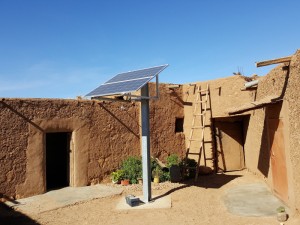WAM

Masdar, Abu Dhabi’s renewable energy company, has installed 50 percent of the solar home systems as part of an innovative project to provide power in rural Morocco.
The installation of 9,000 out of 17,670 systems across 940 villages comes only a year after the partnership agreement was signed between Masdar and Morocco’s Office National de l’Electricite et de l’Eau Potable (ONEE).
The project is expected to be fully completed by the second half of this year. All of the 290-watt solar home systems are designed, supplied and installed under a project that is being executed by the Masdar Special Projects team. Along with other local initiatives, the full installation will result in 99 percent of rural Morocco having energy access by the end of 2017.
Mohamed Jameel Al Ramahi, the Chief Executive Officer of Masdar, commented, “The Kingdom of Morocco is a mature market for utility-scale renewables, but the country has also made exceptional progress in electrifying rural areas. The UAE and Masdar are pleased that our partnership with ONEE is realising one of the largest and most innovative solar home installation projects, which is having a transformative impact on hard-to-reach communities throughout the country. This project advances the global goal of delivering sustainable energy for all, and is another remarkable achievement for Morocco as it prepares to host COP22 at the end of this year.”
The solar home systems are bringing energy access to those rural areas that still lack access to the national grid. Each of the installed systems consists of 290-watt solar panels and batteries with sufficient storage capacity for three days, thus ensuring uninterrupted power supply. In addition, the systems include energy-efficient appliances such as LED lamps and a 165 litre refrigerator.
Director of Masdar Special Projects Khaled Ballaith said, “The uniqueness of our special projects unit lies in the team’s ability to deliver customised renewable energy solutions to remote, rural communities, often under challenging conditions. The systems we designed for rural Morocco are adapted to the particular geography, and various technical elements, such as the mounting frames and three-day storage capacity, help the systems function even under snowfall.”
The United Arab Emirates and the Kingdom of Morocco have strong bilateral ties. Both countries are perceived as renewable energy pioneers where clean energy ambitions are supported with strong solar- and wind- power potential. Morocco is considered one of the Middle East and North Africa’s most promising renewable energy market, with the government already committed to securing 42 percent of nation’s energy from renewable sources by 2020.
WAM/Rasha/Majok







